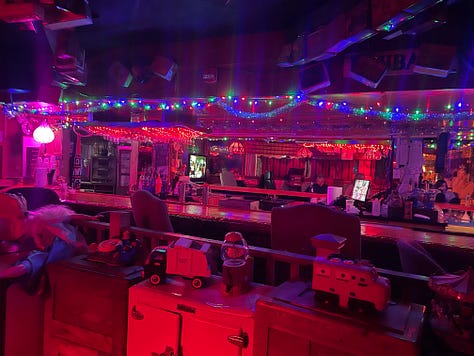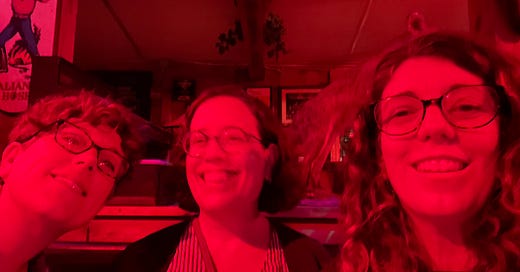Beloved Readers,
I am taking solace in this passage from an essay by Camille T. Dungy entitled “Say Yes to Yourself”:
“I don’t actually believe in writer’s block. I believe in fallow periods. I believe fallow periods are necessary to restore the fertility of a field. I believe that if you’re not writing and you’re worried about not writing, you’re likely to one day write again. That if you’re not writing and not worried about not writing, you may have found new things to do with your time, and that’s okay, too.”
You might have noticed that I haven’t posted my regular biweekly essay for almost two months. (Did you notice? I’m not sure whether it would be worse if you did or if you didn’t.) My silence actually had more to do with Dungy’s second scenario than her first. I enjoyed a puppy-wild summer - I just couldn’t coax myself to buckle down and write. My field got lots of fertilizer, though, in the form of hikes and swims, travel and visits with family and friends, music making and carousing, including a trip to the fabled Bubba’s Sulky Lounge in Portland, Maine, with my sisters.



Now the days are shorter and I’ve gotten my wiggles out. I am back at the keyboard, recommitted to my craft, this time with the support of my very first Stanford Extension School class in the Novel Writing Program, a two year course of study that will guide me through the process of finishing my new book. I’ve been reading ahead in the syllabus, which is where I discovered the Camille Dungy essay.
Far from giving readers a free pass for not writing, Dungy argues that we must steal time for ourselves to write. We must trick ourselves out of our bad habits and find ways to make writing more palatable. We must fight the forces, internal and external, that would silence us.
My most insidious internal force is shame about not being “more productive,” an unhappy side effect of having lived with untreated ADHD for most of my life. Rather than motivating me to work harder, shame shuts me down. So I am walking the line between finding grace in Dungy’s description of fallow periods and heeding her warnings about getting lost in distractions. I’m listening for inward guidance to discern between necessary rest and procrastination, especially in this new era of freedom from paid employment.
Doing so has helped me realize that I badly needed to fertilize my field in order to shake off the Five of Cups energy I wrote about last winter. Then, I was grieving the “failure” of my last novel, or, rather, my failure to find it a home in the publishing world. After writing that essay, I made one last attempt to rework the book and decided that I didn’t want to do it anymore. I almost applied for the Stanford program last spring, but I wasn’t ready, mostly because I was about to shutter my coaching business, and I figured it would be easy to devote my full attention to writing. Why incur the expense of a certificate program? Why commit myself to a linear course of study that would, no doubt, just slow me down? After all, I wasn’t looking for any kind of credential or validation.
The following fall (2023), I started writing a new book, one I’m really excited about. After a month or two of drafting, I recognized some old patterns that concerned me. I was writing during a kitchen renovation, and my office became our living space, which made it hard to focus. My first thought in the morning began, “Okay, to day I’m going to…” and my last thought at night was, “Well, I didn’t…” I spent an inordinate amount of time scribbling in notebooks I then lost track of. Sometimes I was drafting, but more often I was engaging in the frantic cheerleading/castigating self-talk that fills so many notebooks stuffed into cupboards all around my house. If I had written fiction in those notebooks, I could have produced at least three Wars and Peaces (in quantity, not quality!) (By the way, that’s exactly the sort of rueful comment I write in all those journals. So meta!)
I realized that I wasn’t going to succeed without structure and support, so I applied to Stanford this spring and set my manuscript aside until I could get some help.
ADHD is a disorder that affects executive functioning. It doesn’t limit my imagination, or my vocabulary, or my ability to weave a compelling tale. But it severely impacts my ability to sit down, make a plan, and execute it. It also affects the way I process emotions, magnifying the self-doubt, self-recrimination, and despair that all writers face, to some extent. (Except Steve Martin. Check out his essay “Writing is Easy” if you’re looking for some pure silliness in your life.)
This year, in my transition out of coaching, I fell into a trap that snared so many of my coaching clients: I decided that I no longer needed support for my ADHD. When Damien retired in May and we changed insurance providers, I let my Concerta prescription lapse and tried to go it alone. Hell, I didn’t even buy myself a paper planner for a whole two months after my previous one ran out, and I live by paper planners. And I let myself believe that “real writers” hole up in their lairs and create in majestic isolation, even though that model has never worked for me.
I had a great summer. I refuse to regret it or to shame myself for a season of rest and play. But now it’s fall, and I get to have a first day of school and a fresh chance to begin again. Thanks for being patient with me during my fallow time, and thanks for being here now.





I'm excited for your writing journey!!! You are inspiring me to be brave and post again. It's been almost a year. I'm standing on fertile ground.
I have not yet found Camille Dungy to guide me wrong!
The exhaustion of breaking these big goals into manageable tasks is ... well, I don't need to tell you. Try to take care of yourself!